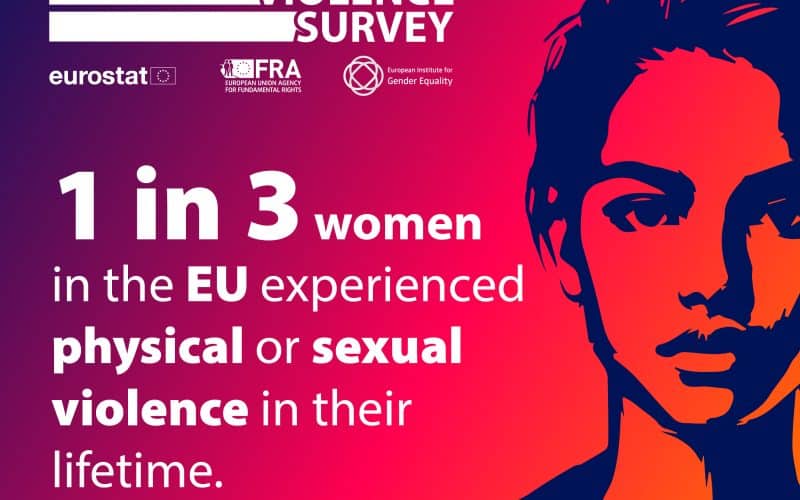
A landmark survey conducted across all 27 European Union member states sheds light on the enduring prevalence of gender-based violence, revealing that one in three women has endured physical violence, sexual violence, or threats in her lifetime.
The study, published by FRA, Eurostat, and EIGE, represents the most extensive data collection on the subject to date, with over 114,000 women sharing their experiences between 2020 and 2024.
We checked the report and below you can find the main results and conclusions. You can find more data in this article as well: 31% Of Women In The EU Experienced Violence
Violence by the Numbers
The survey’s detailed statistics reveal alarming trends:
- Physical Violence: 13.5% of women experienced physical violence or threats in their lifetime.
- Sexual Violence: 17.2% faced sexual violence, with 3.8% reporting rape by non-partners since the age of 15.
- Stalking: 13.6% experienced stalking behaviors, such as unwanted messages or being followed.
A Lifelong Epidemic
Help stop gender-based violence.
— EU Fundamental Rights ➡️ #HumanRights (@EURightsAgency) December 5, 2024
The latest @Eurostat / @EURightsAgency / @eige_eu survey results underline shocking levels of violence against women across the EU.
Find out more:https://t.co/ZqobFEJX2G https://t.co/s6oFQOaZLA
The data show that 30.7% of women in the EU-27 have faced gender-based violence at some point in their lives. This violence often stems from intimate partners, strangers, or acquaintances, and occurs in homes, workplaces, and public spaces. Disturbingly, the Nordic countries of Finland (57.1%), Sweden (52.5%), and Denmark (47.5%) reported the highest prevalence rates, contrasting starkly with much lower rates in countries such as Bulgaria (11.9%) and Poland (16.7%). Experts attribute these disparities to differences in societal awareness, legal definitions, and reporting practices.
Intimate Partner Violence: A Hidden Crisis
Nearly one in five women (17.7%) reported experiencing violence perpetrated by an intimate partner. This includes physical, sexual, and psychological abuse. Countries like Hungary (41.1%) and Finland (33.8%) reported the highest lifetime rates of such violence. Psychological violence, characterized by controlling or abusive behaviors, further inflated the numbers, with 31.8% of women in the EU affected.
Non-Partners and Workplace Harassment
The report also highlights that 20.2% of women faced violence from non-partners, such as colleagues, clients, or strangers. Sexual harassment at work emerged as another pervasive issue, with 30.8% of women in the EU-27 encountering it during their careers. Young women (aged 18–29) are disproportionately affected, with 41.6% reporting harassment. Alarmingly, 15.8% of workplace harassment cases involved male colleagues, and 9.3% implicated clients or customers.
A Cry for Help Goes Unheard

Despite the high prevalence of violence, only a fraction of survivors seek professional help. Just 13.9% of women who experienced violence reported incidents to the police, while 20.5% sought healthcare or social services. Most victims (63.7%) turned to friends or family for support, showing the barriers to accessing formal assistance.
Societal and Legal Gaps
The report underscores the complex factors contributing to gender-based violence, including societal norms, inadequate legal protections, and lack of enforcement. For instance, marital rape remains unrecognized in some EU nations, while others lag in criminalizing behaviors like cyberstalking or online harassment.
The recently ratified Istanbul Convention provides a legal framework to address these gaps, defining gender-based violence as a human rights violation. However, the survey notes that legal definitions alone are insufficient; cultural and societal change is equally vital.
Hope in Action
The EU has ramped up efforts to tackle gender-based violence. Initiatives include the adoption of Directive 2024/1385, criminalizing forms of abuse such as forced marriage, cyber harassment, and female genital mutilation. Additionally, the EU established a unified helpline (116016) for survivors, ensuring accessible support across all member states.
As the survey authors note, public awareness and comprehensive data collection are essential to combating gender-based violence. The findings serve as a stark reminder of the work still needed to ensure a safe and equitable society for all women.
The full report, slated for publication in 2025, will delve deeper into the nuances of gender-based violence, providing critical insights for policymakers, advocates, and communities. Until then, the EU Gender-Based Violence Survey stands as a sobering testament to the pervasiveness of this issue and a call to action for Europe and beyond.
